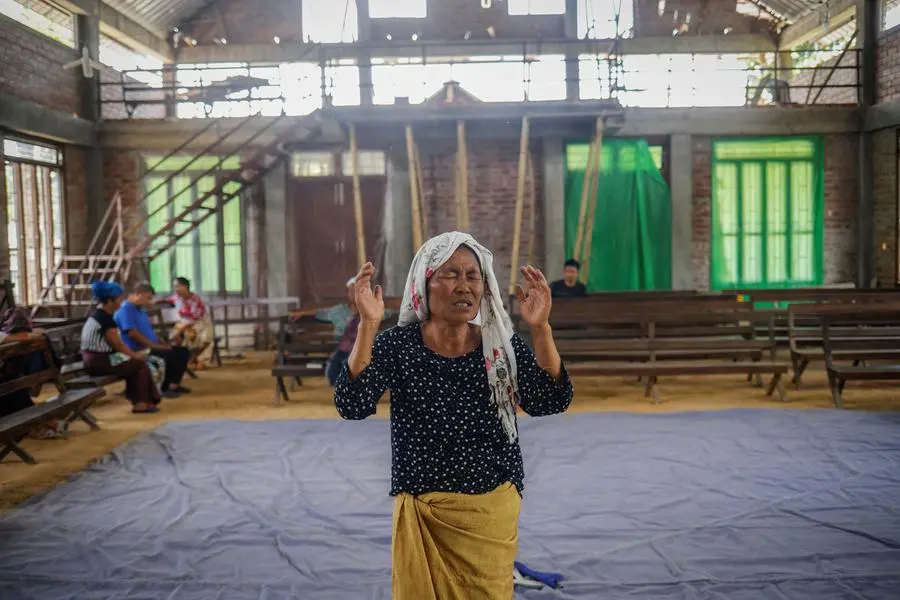PHOTO
In the sectarian violence that has ravaged India's Manipur state, women have been victims of brutal attacks. Residents and security officials say they are also at the forefront of the conflict, picking up arms, blocking troops and according to police complaints, instigating sexual assaults.
India's northeastern states have been historically prone to insurgencies and ethnic violence but the vicious conflict between majority Meiteis and minority tribal Kukis in Manipur hit world headlines last month when a video surfaced of two Kuki women being paraded naked through a jeering mob. In a police complaint reviewed by Reuters, one of the women said she was raped and her father and brother killed.
Kukis say a loosely formed group of Meitei women, known as Meira Paibis, or Women Torchbearers, is responsible for instigating some of the rapes of women of the minority community. The Meiteis deny the accusation but the incidents underline the bitterness between communities in the small state on the border with Myanmar.
"Women’s participation in it (the rapes) underscores the absolute breakdown of all social ties," said Praveen Donthi, a senior analyst at the International Crisis Group who has written a report on the Manipur conflict.
"It has made the physical and emotional divide between the communities complete and reconciliation now looks unattainable."
India's Supreme Court announced this week that it will monitor investigations into cases of sexual violence in the state.
The federal parliament began a no-confidence debate on Tuesday against Prime Minister Narendra Modi's government for being unable to control the violence, although there is no threat to the administration.
Manipur police chief Rajiv Singh and other senior police officials did not respond to multiple requests for comment on the cases of sexual violence.
Since the fighting began in early May, at least 180 people, including 21 women, have been killed and tens of thousands made homeless, according to government data.
Security forces say women also block peacekeeping operations, taking advantage of laws that prevent male troops from any physical confrontation with women. They also occupy bunkers on the frontlines, rifles in hand.
In one case of sexual assault, a 19-year-old Kuki tribal woman told Reuters she was raped near the state capital Imphal on May 15 by three men after she was taken to a group of Meira Paibis and beaten in their presence.
"One of the women from the mob gave clear instructions to four men to kill me," she said in a police complaint filed on July 21, which Reuters has reviewed. She escaped and said she had been too scared to file the report earlier.
Police did not answer questions about the case and there is no record of any arrests.
Moirangthen Thoibi Devi, a Meira Paibis member in Moirang town near Imphal, said suggestions that any Meitei woman could instigate or even support acts of sexual violence were completely "untrue".
"Meira Paibis does not differentiate between Kuki or Meitei," she said, speaking alongside a group of other Meitei women. "Kuki mothers are also in pain, Meitei mothers are also in pain."
WORSE THAN ANARCHY
The women said they had heard of nine Meitei women being raped, but they had no evidence and were not directly aware of any incidents. Reuters was unable to locate any victim and police and Meitei civil society bodies did not share information of any known cases.
Ngainekim, the president of the Kuki Women Organisation for Human Rights, said she had sent a letter to the prime minister in July saying that "sexual violence and rape as a method or tactic of warfare is being widely perpetrated" by the Meiteis.
Ngainekim, who uses one name, said in the letter that she knew of 13 cases of Kuki women being raped or murdered, including two women who "the Meira Paibis dragged out... from their hostel and handed over to the Meitei menfolk". They were "later gang-raped and killed in a car wash shed" in East Imphal, she said in the letter, which was reviewed by Reuters.
In a police complaint reviewed by Reuters, the mother of one of the victims blames unnamed Meitei youth but does not mention Meira Paibis.
"The reports of women urging their menfolk on to rape Kuki women...should terrify us," wrote historian and author Mukul Kesavan in a newspaper column. "A state where women abet the public rape and murder of other women is slouching towards a nightmare worse than mere anarchy."
TAKING ADVANTAGE
Security officials accuse women on both sides, but largely Meiteis, of blocking troops from conducting operations, and regulating entry points to their villages. With few women soldiers, the army does not have the authority to act against women.
The Meira Paibis “have weaponised it very well, it’s a major chink in our system,” said a senior officer from the Assam Rifles paramilitary organisation assigned to peacekeeping duties.
"There is a reason we block the army...because they have directly supported the Kukis," said Thoibi Devi, the woman from Meira Paibis, standing with other women at a checkpoint where they stop all vehicles, including military ones.
Vak Vaiphei, a Kuki leader in the tribal-controlled Kangvai village, said when military personnel try to take over their bunkers, women surround them and push them out.
Nearby, a Kuki woman, wearing a black T-shirt, camouflage trousers and holding a double-barrelled gun, said she felt safer taking up arms against the Meiteis.
"I will be scared if I sit at home," Lamnu Haokip, 23, said. "But now I'm here, so I can shoot them." (Reporting by Krishn Kaushik in Manipur; Editing by Raju Gopalakrishnan)




















